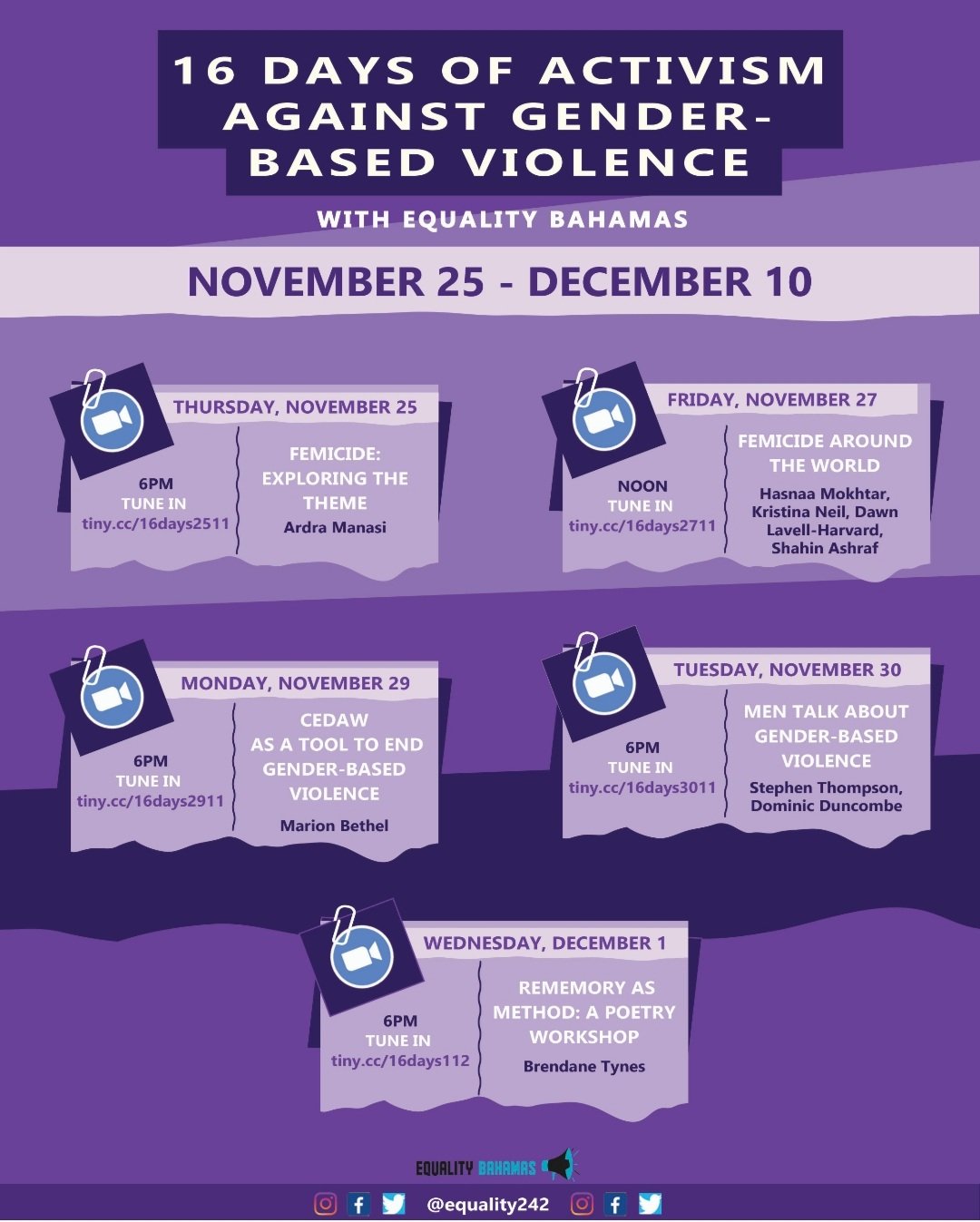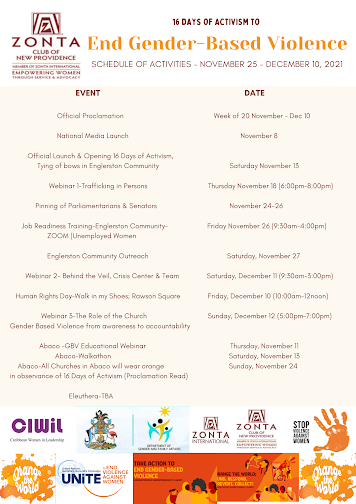NASSAU, BAHAMAS — The gut-wrenching footage of a mother being brutally beaten as she held her child, and later run over by a car feels horrifying, surreal, and gratuitous. Despite the sermons and outrage over the recent death of a young child, the public is forced to reckon with yet another extreme case of abuse and in graphic detail. It would be easy to think of these abuses as signs of social decay due to the economic and psychological strain of the pandemic — which continues to stretch and distort our behavioral culture. Sadly, it is more likely that when one abuse case rises to the national fore, similar incidents are also exposed like bugs scrambling out from under a rock.
“Every month, there is a story of gender-based violence that captures the attention and concern of the general public and we spend two maybe three days talking about it,” said Alicia Wallace, director of Equality Bahamas.
“Talking and waiting for someone to do something, and everyone is waiting for someone else to do the thing. Equality Bahamas consistently presents opportunities for the public to engage in conversations and actions to contribute to policy but the excitement dies down and people are more interested in demonstrating their rage on social media than actually contributing to solutions.”
As we look to this administration for legislative and policy framework, it is important to note that the problem that faces us is not for lack of identification or awareness.
In 2013, the government launched a national task force to steer the development and implementation of a strategic plan to address gender-based violence. Two years later, a National Strategic Plan on Gender-based Violence (GBV) emerged that set out the guidelines for a GBV Authority and listed “10 Low-lying Fruit”, specific programmes that could be achieved immediately through existing government agencies.
It defined gender-based violence as “violence that is directed against a person on the basis of gender. It constitutes a breach of the fundamental right to life, liberty, security, dignity, equality between women and men, non-discrimination and physical and mental integrity.” The report furthered that, most predominantly, “gender-based violence reflects and reinforces inequalities between men and women”.
Using data from 2000-2013, the report found that The Bahamas had “the highest incidence of rape per capita in the Caribbean”. It further pointed to gaps in psycho-social support services, including: “the lack of a national protocol for the comprehensive management of Gender-based Violence; Limited shelters for victims; Limited availability of providers and intervention services after 5pm when the majority of the cases will occur; Limited coverage of all services in New Providence, almost non-existent in the Family Islands.”
Much like the social media advocacy and official statements emerging in recent days, the 184-page report called for multi-sectoral coordination, institutional strengthening, advocacy and awareness supported by education and training, research and surveillance, and deeper coordination with civil society.
The 10 Low-lying Fruit included:
1. Focus on the Family: The Creation of a Unified Family Court System
This is a primary, secondary and tertiary prevention programme involving the Judiciary, The Attorney General’s Office, Ministry of National Security and the Police.
2. GBV Prevention: a National Community Awareness Programme
A nationwide program of public awareness initiatives including public service announcements (PSAs).
3. Focus on Male/Female Programmes: The Creation of a Department of Family and Gender Affairs
The transformation of the Bureau of Women’s Affairs into the Department of Family and Gender Affairs (this was achieved in 2016).
4. Focus on Male Mentoring: A CariMAN Project
A program to train men to become mentors and volunteers for GBV programmes utilizing projects from Caribbean Men Action Network, “a community of caring men, committed to partnering with women to create a just world where all people achieve their fullest potential”.
5. Reclaiming our Boys Project
An intervention after-school programme targeting at-risk school-aged boys involving the Ministry of Sports, Youth & Culture, Ministry of Education, Science & Technology, Ministry of Social Services and Community Development, and The Bahamas Crisis Centre.
6. Family Island Co-ordination Councils Set-up
This programme calls for a GBV coordination council for each Family Island to coordinate, record, and assist with victims as incidents are reported, involving the Ministry of Social Services and Community Development.
7. Sexual Assault Response Team Project
A tertiary prevention programme to provide safe space for acute care and trauma management, and expedite sex assault trials involving the Ministry of Health, Public Hospitals Authority, Bahamas Crisis Centre, Police, and the Attorney General’s Office.
8. A National Early Intervention Programme for Children Exposed to Violence: A Crisis Center Project:
The report identified two programmes designed by the Crisis Center that were ready to be launched, but lacked of funding to pay the stipends for qualified counselors. An early intervention program for children exposed to domestic violence, and another for children under the age of 12 who sexually abuse other children.
9. Programmes for GBV Perpetrators
A tertiary prevention programme to reinforce existing treatment for abusers “batterers” and establish programs in the Family Islands under the auspices of the Ministry of Grand Bahama, the Ministry of Local Government, the Ministry of Social Services and Community Development, the Catholic Archdiocese, and the Judiciary.
10. Domestic Violence Fatality Team Project
A prevention programme to “review the causes behind situations of victims who have died – cold cases” incorporating the Office of Attorney General, the Police, Ministry of National Security, Ministry of Health Ministry of Social Services and the Bahamas Crisis Centre.
What the country needs now is not direction, but willpower and speed. We need to make up for lost ground, and make good on the promises made to honor the souls lost due to our collective inaction.

The global annual campaign led by the United Nations “16 Days of Activism against Gender-Based Violence” kicks off next week with local groups like Equality Bahamas and the Zonta Club of Nassau hosting a slate of forums and community events. It starts on the International Day for the Elimination of Violence against Women, November 25, and will run until December 10, Human Rights Day.
Registration links can be found on Equality Bahamas’ and Zonta Club’s Facebook pages.
Zonta Club put a spotlight on Nassau Village last year, leading a candlelight vigil to honor the lives of several women who were murdered in the constituency over the past year.

The club launched its campaign in Englerston last Saturday with scheduled events over the next two weeks also taking place in Eleuthera and Abaco.
Wallace continued: “We have to call not only each other out but call ourselves to a higher standard and make the decision to move beyond the status quo, which is very temporary outrage that goes away.
“We need think about the version of this place that we want to live in and be a part of and we need to start creating that – its not enough to identify problems. We have to be able to get to the root of the problem and figure out what all of our various roles are in this intervention using the resources that we have available to us and by tapping into the communities that we are already a part of.
“So if you are a part of a faith organization, getting women’s groups, men’s groups, youth groups, to develop or use existing programming to talk about these issues and provide people with resources to get support if they need it. The same goes for our families and our schools because it seems to be quite easy to talk on social media but the test of our commitment to addressing this issue or creating change is our willingness to actually talk to the people we engage within our daily lives, the people we have real relationships with. Are we prepared to call people out when we hear them using violent language, speaking disparagingly about women and girls, joking about sexual violence, or are those still things we are prepared to let slide?”






